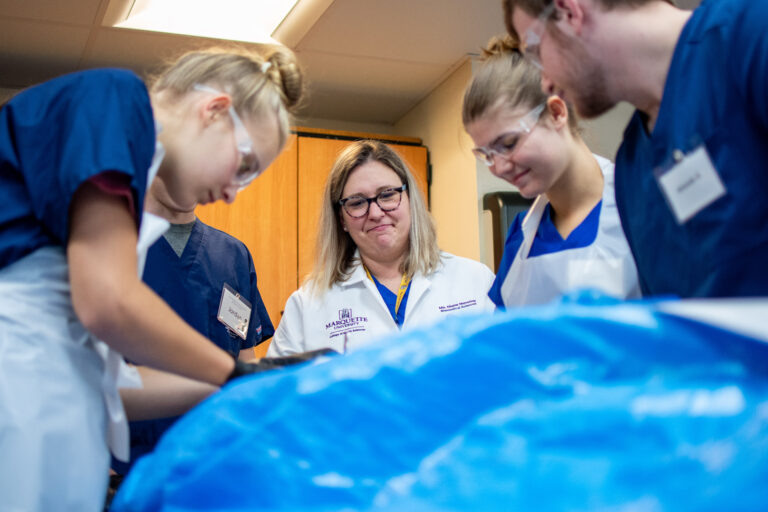When psychologist Dr. Kavitha Venkateswaran began working with patients in a women’s health clinic in Milwaukee about five years ago, she was surprised to find few services for perinatal mental health — and grew determined to fill the gap. Her passion for the mission only increased after she experienced the swirling emotions of her own pregnancy and postpartum period.
“Even for folks who have never had any history with mental health issues, it’s such a huge time of change and transition, with different stressors and identity changes,” says Venkateswaran, clinical assistant professor of counseling education and counseling psychology. “I found that it was a really important time in one’s life to have good access to mental health care. Poor mental health status can have quite an impact on health outcomes, both for the mother and the baby.”
Now Venkateswaran and her collaborators at Marquette are developing an interdisciplinary prevention program for perinatal depression with three aims: strengthen an existing intervention to make it more culturally responsive, expand the perinatal mental health workforce through training, and form a perinatal mental health collaborative to gather resources and make it easier for new and expecting parents to access support. The project is funded by the American Rescue Plan Act through a $250,000 grant administered by the Medical College of Wisconsin.
Other Marquette faculty, including Dr. Sabirat Rubya, Northwestern Mutual Data Science Institute assistant professor and co-director of Marquette’s Social and Ethical Computing Lab, are working on additional ways to improve perinatal mental health.
Addressing health disparities
Their community-oriented research interventions are especially needed in Milwaukee.
“We are really hoping to make a broad-scale change in the community, especially in addressing the stark disparities in maternal health outcomes for women of color,” says Venkateswaran, the program’s principal investigator. “We think Milwaukee is a great place to bring this intervention and hopefully fill a gap. But if it’s successful and well received by clinics and clients, I think we could take this outside of Wisconsin, too.”
The project is supported by a powerhouse interdisciplinary team: Dr. Lisa Edwards, professor of counseling psychology and director of Marquette’s Institute for Women’s Leadership; Dr. Kimberly D’Anna-Hernandez, associate professor of psychology; and Dr. Karen Robinson, associate professor of nursing. After discovering their shared interest in perinatal mental health, Edwards suggested these colleagues brainstorm ideas for collaboration.
“I think the interdisciplinary nature is essential,” Edwards says, noting that expecting and new moms navigate a landscape of obstetricians, midwives, hospitals, pediatricians, social workers and more, without much clarity about who owns the issue of mental health. “It’s essential that we’re always thinking in a more comprehensive, contextual way about how to support the system. It’s not just the baby. It’s not just the mom. It’s everybody.”

As many as 80 percent of mothers develop what’s commonly known as the “baby blues” during the two weeks after childbirth, and 1 in 7 mothers have this condition progress to postpartum depression. Although it gets less attention, depression during pregnancy is common too, especially for women of color. D’Anna-Hernandez’s research has found that Mexican and Mexican American women are three times more likely to experience depression during pregnancy compared with the general population.
“That’s also a time when the central nervous system of the baby is developing,” says D’Anna-Hernandez, who directs the Cultural Perinatal Health Laboratory at Marquette. “So, it can have these long-term effects for both the mother and the baby.”
Designing better support for perinatal mental health
Early intervention is critical. “After the baby comes, it’s much harder to develop skills and tools to start making changes in your life. Oftentimes, at that point, the stress is so high and folks are sleep deprived,” Venkateswaran notes. “If we can prevent or reduce mental health concerns during pregnancy, we’re likely going to start seeing some of those health outcomes improve as well, both for the mother and the child.”
The team is adapting and augmenting an existing, evidence-based perinatal prevention program — known as Reach Out, Stay Strong, Essentials for mothers of newborns (ROSE) — developed at Michigan State University. The program can be delivered by any health care worker, not just mental health clinicians.
To make the program even more accessible, the Marquette researchers are adding a telehealth option and making the content more culturally relevant for mothers from diverse backgrounds.
“We want to weave in information about cultural and social justice factors for birthing people of color,” Venkateswaran explained. “We want to incorporate issues like medical mistrust due to years of systemic racism, consideration of cultural healing practices, and how to talk to your provider about what’s important to you.”
The program covers other issues that can worsen moms’ depression and anxiety — from breastfeeding to sleep deprivation to pelvic floor issues after childbirth. By making the program more comprehensive, researchers hope to reach more pregnant and expecting moms who may not traditionally think of themselves as needing mental health support.
Community-driven research
To ensure the project meets the community’s needs, the team at Marquette regularly meets with clinicians who work with new and expecting mothers. A doula nurse and physical therapist are among their collaborators. “It’s really exciting that we’re working with folks who are working every day with patients,” Venkateswaran says. “It really is that merging of research, practice and community.”
The researchers are gathering feedback from clinic partners and community members on the program content and then will train partners from local clinics on how to use the intervention later this fall. The team will support clinics during the implementation stage and assess the program’s impact on parents’ stress rates and confidence levels.
“The unique nature of our grant really calls for program evaluation and research,” Edwards says. “We need to ask, ‘Is your training effective? Have I learned the content that I need to learn?’ Things like that are going to be inherent in the evaluation of the program.”
“We believe that a lot of scholarship can come out of this work,” Venkateswaran says. “We know that research has historically excluded the lived experiences of marginalized groups. And we’re constructing this intervention to meet the needs of birthing people of color. That opens the door to studying the effectiveness and sustainability of this intervention in clinics, and particularly looking at people of color and their unique experiences, barriers and access to care.”
And that’s promising for the future of perinatal mental health in Milwaukee and beyond. Says D’Anna-Hernandez: “I really see this collaborative being just the beginning of … where we can go and take this work.”



